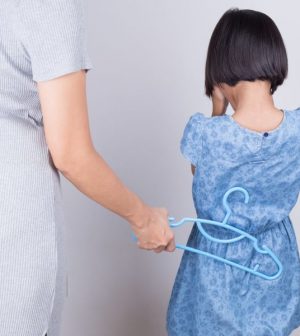- Could Your Grocery Store Meat Be Causing Recurring UTIs?
- Are You Making This Expensive Thermostat Error This Winter?
- Recognizing the Signs of Hypothyroidism
- 10 Strategies to Overcome Insomnia
- Could Artificial Sweeteners Be Aging the Brain Faster?
- Techniques for Soothing Your Nervous System
- Does the Water in Your House Smell Funny? Here’s Why
- Can a Daily Dose of Apple Cider Vinegar Actually Aid Weight Loss?
- 6 Health Beverages That Can Actually Spike Your Blood Sugar
- Treatment Options for Social Anxiety Disorder
If You Suspect a Child Is Being Abused or Neglected, Report It

You should alert authorities if you suspect a child is being hurt or is in danger, a child abuse expert says.
The issue is in the spotlight with the recent arrest of David and Louise Turpin, the California couple accused of abusing their 13 children for years.
Members of the public can report concerns anonymously, which is what happened in the Turpin case, according to Melissa Jonson-Reid, co-author of a recent book about child abuse.
“Is it uncomfortable to decide to report maltreatment and then be uncertain with what will happen? Of course. Lots of people, even professionals, have wrestled with this,” said Jonson-Reid, professor of social work research at Washington University in St. Louis.
“While professionals with contact with children are mandated to report by law — and most receive some form of training in the process — the public is generally not,” she added in a university news release.
There are several reasons why community members and even professionals fail to report concerns, she said.
They include not knowing about the availability of hotlines or how to report; uncertainty whether concerns are serious enough; fears of reprisals; and even worries about the response of child welfare officials being either overly invasive or inadequate.
All U.S. states and territories have child abuse hotlines. Neighbors, family and other community members account for nearly 40 percent of child abuse reports investigated nationwide, Jonson-Reid noted.
Hotlines can answer questions about what is “reportable,” she explained.
“You can call and say, ‘I really don’t know if this is reportable … is it?’ Or if you are worried about starting with a call to the child protection agency, there is a national helpline that can give you information and help you assess whether you should call child protection,” Jonson-Reid said. The number for the National Child Abuse Hotline is 1-800-4-A-Child (or 1-800-422-4453).
“If we all keep silent, this guarantees no response — and that can have lasting and tragic consequences,” she said.
Physical violence is not the only kind of abuse, she added. Neglect, which many people later said they noticed in the Turpin case but did not report, can also have tragic consequences.
More information
The U.S. Children’s Bureau has more on preventing child abuse and neglect.
Source: HealthDay
Copyright © 2026 HealthDay. All rights reserved.










